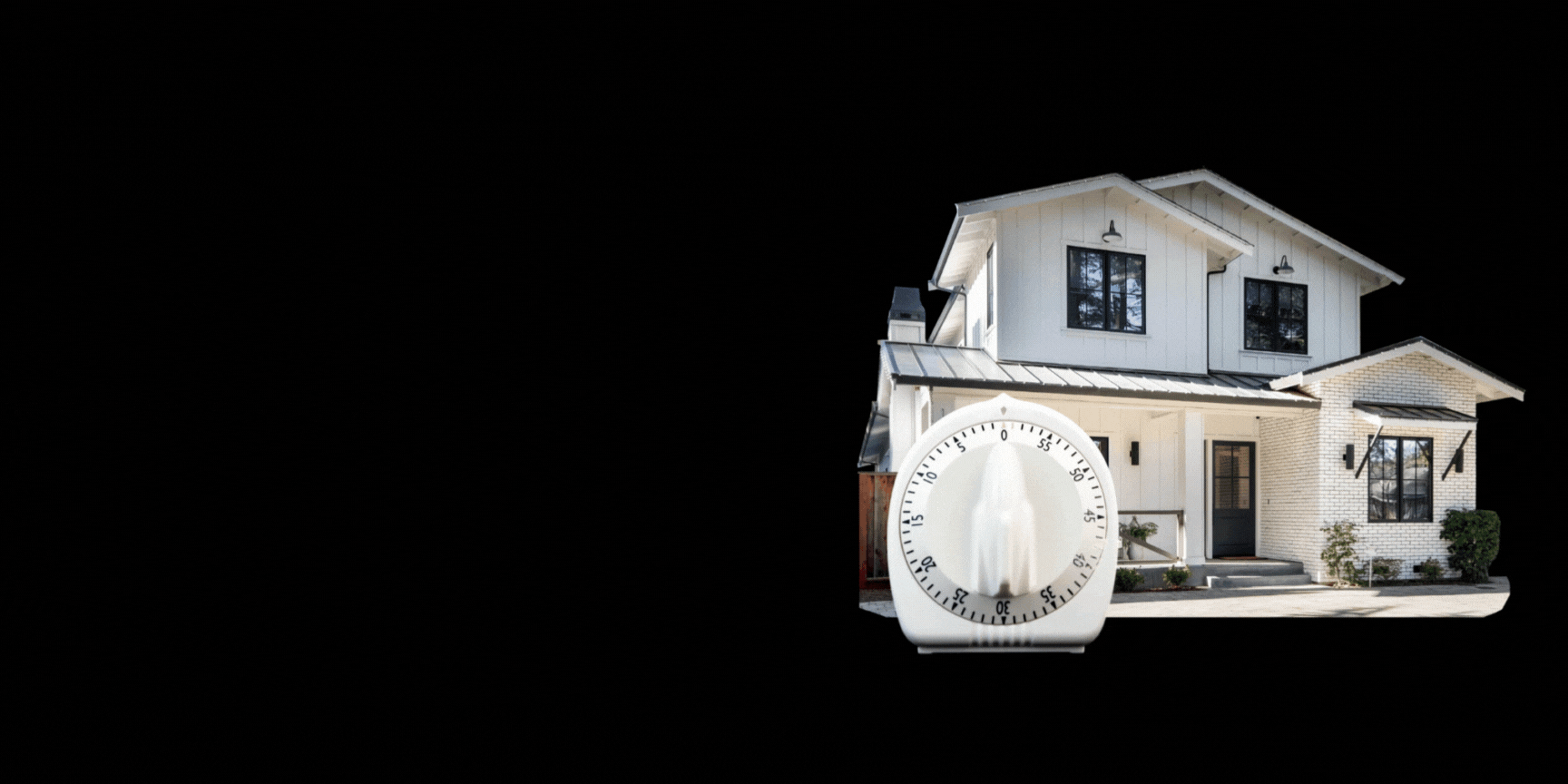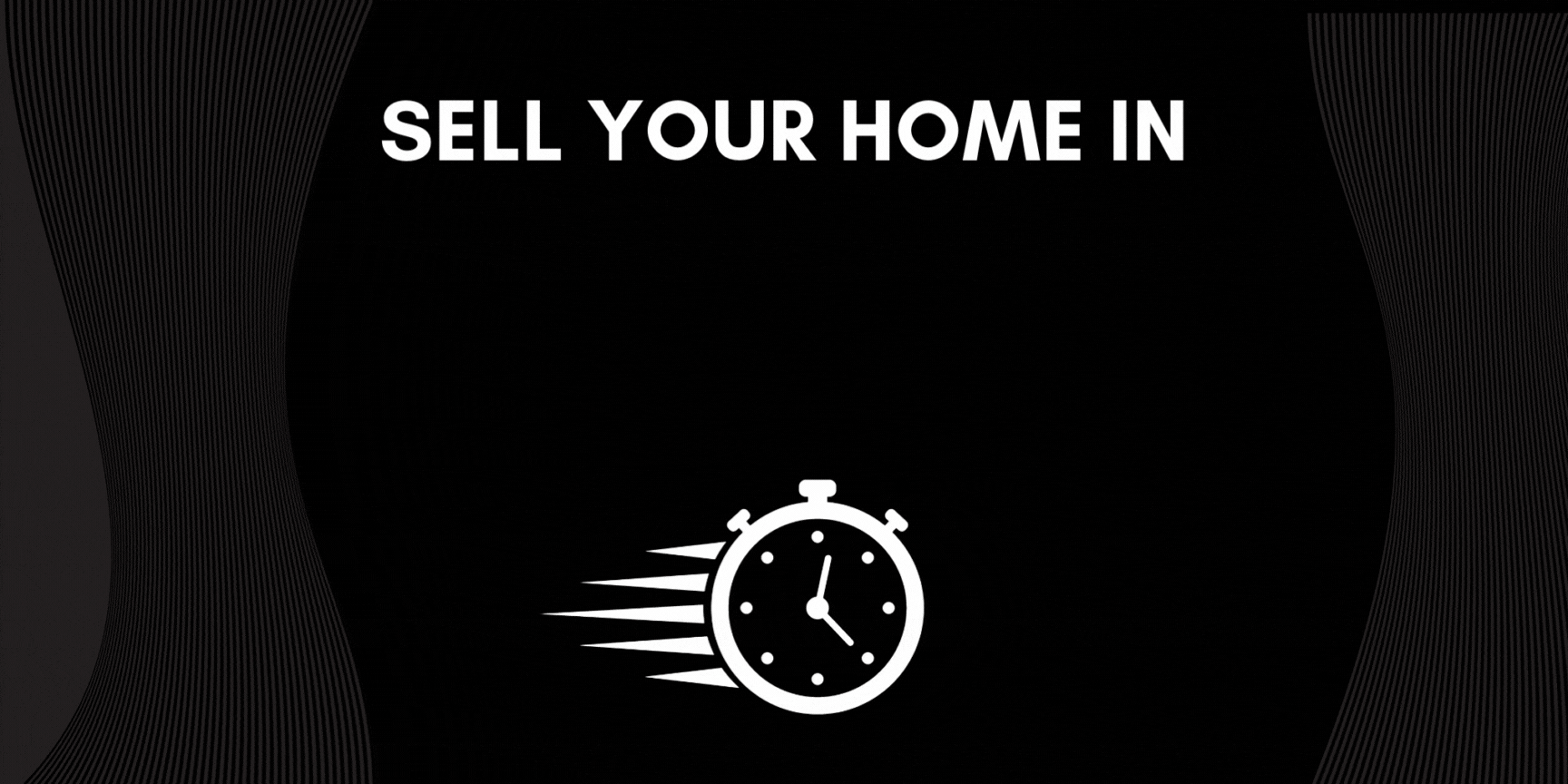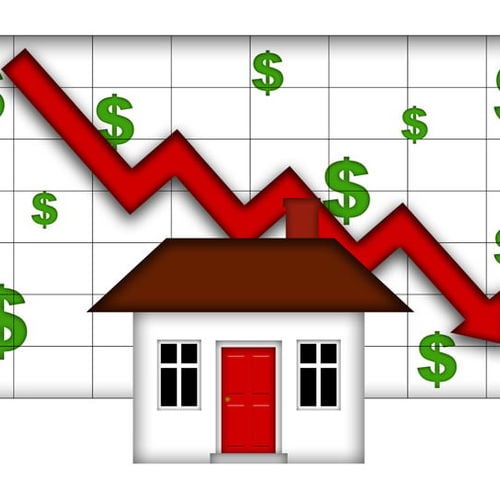In times of low inventory and strong buyer demand, it seems that any home can be sold, before even so much as a for-sale sign goes in the dirt. In fact, demand is so good that just whispering to a friend or family member that you might be selling your home is often enough to garner at least informal offers. At times this can be so commonplace that many homeowners at least consider selling their home in a private sale vs. public sale on the MLS.
When a home owner is deciding to go the route of a private sale vs. public sale on the MLS, the first question they need to ask themselves is: what is most important to me?
For some people, the answer to that question is they want the sale to be quick and easy. They don’t want the hassle of cleaning, repairing, and staging a home for sale. For those people, selling via a private sale might appear to be the best way to go.
Other folks will simply want that the home go to someone they feel is a “deserving” owner: a friend or family member they know well, or perhaps someone from their church. They want to sell to someone they feel shares their same values, and will maintain the home and observe the same sorts of traditions that have been followed by those who have owned it previously.
If quick and easy, or knowing your home’s next owner well are most important to you, selling your home via a private sale could be in your best interests. But keep reading – there’s more to consider.
For most homeowners, the most important consideration is how much money they will walk away with at the end of the sale. For those people, the way forward is more clear. Opening the home up for a public sale on the MLS will present the home to the widest pool of potential buyers. A larger pool of buyers increases the odds of finding a buyer who will pay more for your home than, say, your neighbor or one of your old drinking buddies.
If selling your home for the most amount of money is your most important criterion, then selling it via public sale on the MLS is your best bet. Unfortunately for many home owners, it isn’t as simple as all that. –Seb Frey, REALTOR®
The tricky thing is that for some people, they won’t really be able to identify what is most important. Some things will be equally important, or perhaps, one thing will be most important but the others important as well. For example: a lot of home owners actually need the sale to be quick and easy – but they also need to get the most they can for the property. Perhaps they are ill, or simply don’t have the energy to get the home into prime shape, but need the money to pay for something expensive, like medical bills, long-term care, or a child’s college education.
The primary virtue of a private sale is that they are usually quick and easy, or at least, they have the potential to be quicker and easier than a public sale. In most cases, private sales happen between parties who already know each other, and with the buyer already being at least somewhat familiar with the property. Likewise, the seller often knows the buyer well enough that they feel the home will be left in good hands, and won’t turn into a den of iniquity or bulldozed and replaced with a McMansion.
Where a private sale starts to look less attractive is when it comes to netting the most money for the sale. Often times in a private sale, there is no commission, or a much lower commission, and you may not need to lay out cash preparing the home for sale on the open market. But will that be enough to offset the potentially substantial increase in sale price with a public sale? How can you be sure, either way?
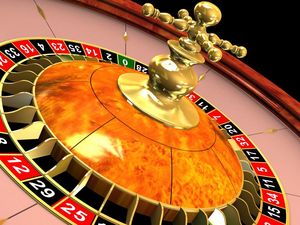
There’s no such thing as a sure bet – so play the odds!
The truth is, there is no way to be 100% sure, unless a buyer is offering you such a price premium it would be clear folly not to accept it. Given the absence of a too-good-to-be-true offer, the best you can do is be reasonably sure, by determining what the home would sell for on the open market, both “as-is” (without doing much or little in the way of getting it ready for sale), and by selling it in prime condition using a proven, guaranteed system for selling your home for the highest price, in the shortest time possible.
It may well be that your neighbor (or ex-college roommate, or whoever!) is in fact willing to pay a price that nets you the most for your money – or close enough to it that you won’t miss the difference, especially considering it might save you time and effort.
But before deciding to who and how you sell your home, it’s important you first make a realistic assessment of the home’s current condition. You should do this before talking seriously with anyone about how much you’ll sell it for. You’ll then want to figure out how much you could net for it for as-is, without doing anything to the home, and what you’d walk away with if carried out the required repairs, staged the home properly, and marketed it to the general public for sale at the highest price possible.
It’s important for you to understand your home’s worth on the open market when negotiating with any buyer – even one that you already know. It’s best to have the facts on the table – the home’s condition, it’s as-is market value, an as-is repaired value, the cost of sale with a public versus a private sale, and all the rest. Once you have run the numbers and have a clear-eyed view of your home’s condition, market value, cost of sale, repair costs, and are really in touch with what matters most to you, you’ll be able to make the best decision regarding a private vs. public sale on the MLS.
The 1000Watt Study from 2024
A November 2024 survey performed by 1000WATT Consulting of 2,000 homeowners found that 35% of prospective home sellers initially preferred to market their home off the MLS. However, after learning that off-MLS homes typically sell for 15% less, nearly three-quarters of them changed their minds and opted for MLS marketing instead. Among all respondents, only 8% still preferred off-MLS sales after learning the financial impact.
However, one question the remains is, where did that “15% less” number come from, and how accurate is it? And what if the differential were much smaller than that, say something like 1-4%, how might survey respondents have felt about selling on the MLS vs. privately, off-market? That is unknown. But it is likely that the “15%” figure used by the survey came from a study by BrightMLS performed in 2021 – which shows a vastly different result from a more-recent study by Zillow in 2025.
I should say that I haven’t actually seen that survey, because it’s locked behind a $495 paywall.
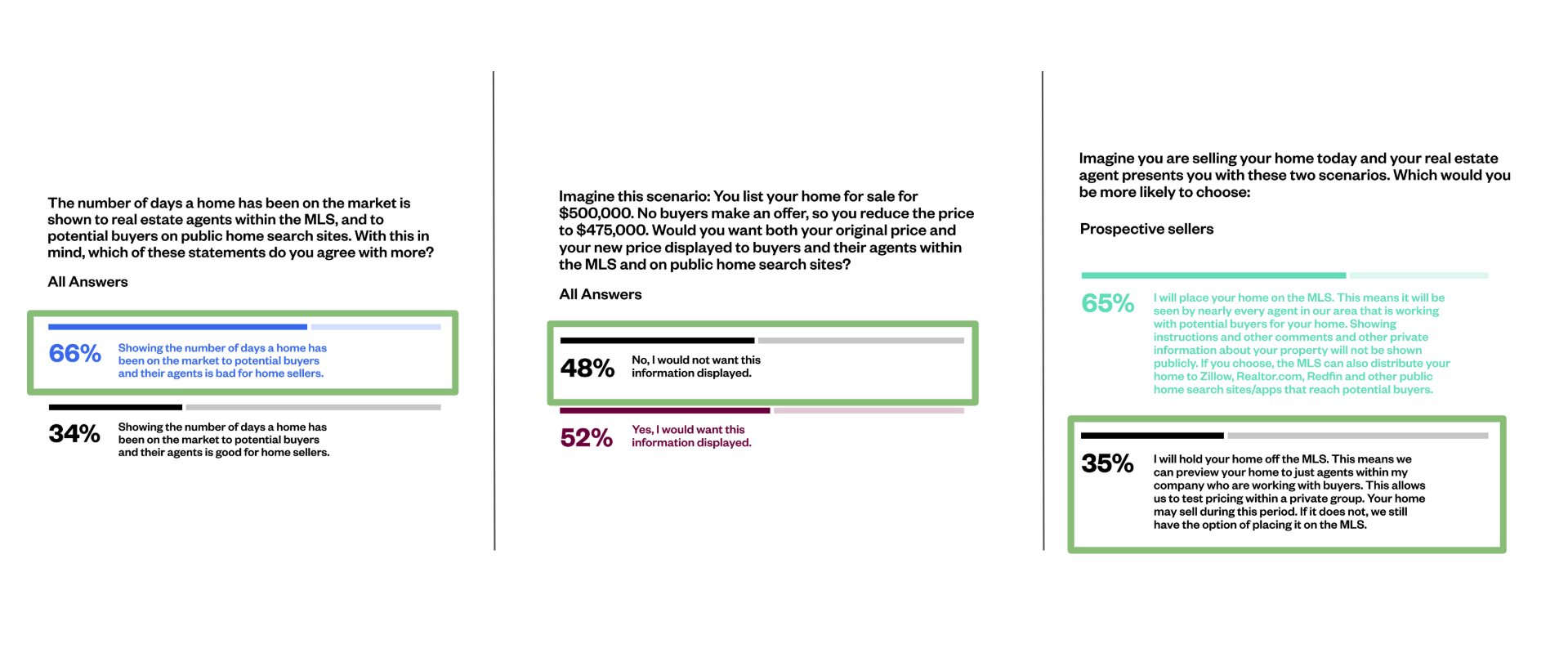
1000Watt Survey Results
The Famous BrightMLS Study from 2021
A Bright MLS study from 2021 analyzed more than 840,000 home sales across six Mid-Atlantic states from 2019 to 2022 and found that homes listed on the MLS sold for an average of 17% more than off-MLS sales. The study also found that homes on the MLS had greater price transparency, more buyer competition, and a median time-to-sale of 12 days—faster than many off-market transactions. Additionally, sellers who listed on the MLS were more likely to receive multiple offers, which contributed to higher final sale prices. The study suggests that wider market exposure through the MLS leads to better financial outcomes for sellers compared to selling off-market.
You can download the BrightMLS study here.
The Zillow Study From 2025
More recently, Zillow performed a study in 2005 that said sellers lose about 1.5% on average selling their homes off the MLS. The study claims to have analyzed 1.2 million home sales from 2023 to 2024 and found that homes first listed as private listings on private networks before going fully active on the Multiple Listing Service (MLS) sold for 1.5% less on average than those listed directly on the open market. In California, this gap was wider, with private-network homes selling for 3.7% less. The study also found that lower-priced homes saw the biggest price difference, with bottom-tier properties selling for 3.1% less when listed privately first. Zillow suggests that limiting early exposure to a smaller buyer pool may reduce competition and lower the final sale price compared to homes immediately listed on the open market.
Of course, Zillow’s numbers are radically different than the numbers from BrightMLS. Actually, the way I look at it, Zillow’s numbers (which are highly suspect, because their definition of market value is the Zillow Zestimate, a deeply flawed statistical number) show that in most cases, sellers actually make more money selling off-market than going on-market, once you consider the lower costs which are typical of off-market sales.
Zillow Survey on Private Listing Networks
A Zillow survey of 3,000 recent home sellers published in January 2025 claims that nearly 1 in 4 (23%) sold their home off-market or through a private listing network (PLN) rather than listing publicly on the Multiple Listing Service (MLS). The top reasons for selling off-market included privacy concerns (60%), wanting a faster sale (53%), and avoiding home preparation costs (35%).
However, the survey claims to show that many off-market sellers later regretted their decision, with 61% believing they could have gotten a higher price if they had listed publicly. The survey also found that first-time home sellers were twice as likely to sell off-market compared to repeat sellers, and that many off-market transactions were influenced by agent recommendations rather than seller preference alone.
Should you sell Privately, or have a Public Sale on the MLS?
As with so many contentious issues in real estate, there is no one right answer to this question. If you ask me, the only way to be 99% sure that you are getting the absolute highest price for your property is to list it for sale publicly on the open market, which means putting the listing on the Multiple Listing Service. And the reason I say 99% sure vs. 100% sure is that because the possibility exists that you could find someone who would pay a very high price for a property if they discovered it as, say, a Compass Private Exclusive, but the seller’s strategy was always to go onto the MLS…only to find that once on the MLS, no other buyers would offer that price. That could happen; I am sure it has happened many times.
But some sellers would happily trade privacy and convenience for a lower sale price – all the data show that there is a segment of the market that doesn’t actually care about getting the absolute highest sale price for their property; other considerations are at least somewhat more important.
And if in fact Zillow’s numbers are close to accurate, that sellers only “lose” 1.5-3.7% on the sale price of their homes, and if in fact they saved a similar (or, I believe, a much greater amount) of money by skipping much of the pre-sale home preparation and related expenses, I am sure that number would be far greater than 8% of sellers cited by the 1000Watt survey – probably much closer to the “original” 35% who said they’d be interested in pursuing an off-market sale.
And honestly, I think that’s what makes the Compass Three Phased Marketing Strategy so compelling. Sellers can have it both ways: try selling it privately for a while, gain feedback, and see if there’s a buyer out there who will get them the price they want (which, often times, is an aspirational price they are just testing out). And buyers will know that if the sellers don’t sell it off-market, the next step is to go on the MLS, where they will face the full brunt of competition from the open market. This incentivizes such buyers to make a strong offer, rather than a lowball offer which is typical when selling in an environment where buyers feel they have no other competition.
Still unsure which way to go? Reach out to me and let’s talk about it!
Amazing Mountain View Homes for Sale
2
3
4
5
6
7
8
9
10
11
12
13
14
15
16
17
18
19
20
21
22
23
24
25
